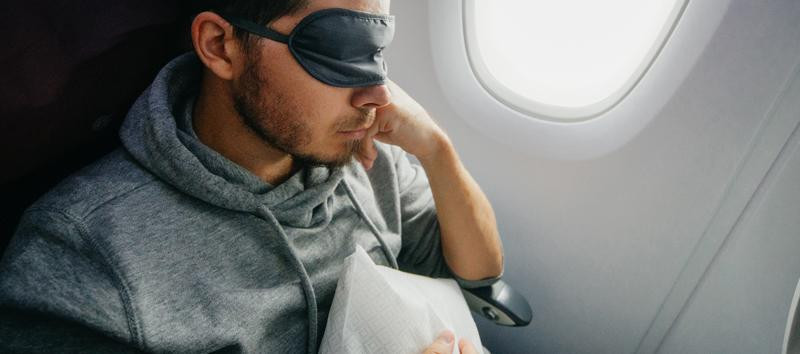Can You Fly If You Have A Concussion? Yes, generally, flying after a concussion is safe, but it can temporarily worsen symptoms due to the unique stressors of air travel, such as visual and auditory stimulation, time-sensitive decision-making, and stress, so flyermedia.net provides essential guidance to help you navigate air travel with a concussion. By understanding which symptoms can be exacerbated and implementing proactive strategies, you can minimize discomfort and ensure a smoother journey. For expert insights on aviation safety, concussion management, and post-concussion care, explore flyermedia.net and learn about travel safety tips, brain injury recovery, and aviation health advice.
1. Is Flying Safe After a Concussion?
Generally, flying is usually safe after a concussion, but the experience can be challenging. Air travel involves several factors that can exacerbate concussion symptoms:
- Extreme visual and auditory stimulation: Airports and airplanes are filled with bright lights, loud noises, and crowded spaces.
- Time-sensitive decision-making: Navigating airports requires quick decisions about gates, food, and connections.
- Stress and confusion: Flight delays, gate changes, and baggage issues can be overwhelming.
These stressors can easily overstimulate someone with a concussion, making it difficult to function normally. Consider the severity and recency of your injury, as well as whether you’re suffering from post-concussion syndrome, to determine the best course of action.
1.1 What if You Suffered a Concussion Recently?
It’s generally safe to fly with a concussion, but understanding the potential effects is crucial.
1.1.1 What Do the Studies Show?
Limited research offers mixed insights. One study of collegiate athletes and military cadets found that flying shortly after a concussion did not affect symptom severity or recovery time. However, a study of NHL players indicated that those who flew within six hours of a concussion experienced slightly longer recovery times, potentially due to decreased oxygen levels and lack of rest.
1.1.2 Speaking of Brain Rest: How Much Sleep Have You Had?
 A man resting on the plane with an eye mask covering his eyes.
A man resting on the plane with an eye mask covering his eyes.
Adequate sleep is crucial for concussion recovery, as it allows the brain to flush out toxins. Research suggests that better sleep quality is linked to improved brain function after a brain injury. If you’re experiencing sleep problems post-concussion, consult resources for strategies to improve your sleep.
1.1.3 What If You Just Had a Concussion… But You Feel Fine?
Even if you feel fine after a recent concussion, symptoms might appear later due to delayed onset. The stressful conditions of air travel can push your brain too far, triggering symptoms. It’s rare for symptoms to suddenly appear during a flight, but it is possible.
1.2 Is It Safe to Fly with Post-Concussion Syndrome?
If you’re still experiencing symptoms weeks after a concussion, you might have post-concussion syndrome. In this condition, the brain struggles to return to its normal, efficient functioning, leading to persistent symptoms.
Flying with post-concussion syndrome is generally safe, but it can temporarily worsen symptoms. Don’t let fear prevent you from flying for important events or treatment. Addressing symptoms early is crucial, as prolonged symptoms can become more difficult to overcome.
1.3 Are There Times You Shouldn’t Fly with a Concussion?
Flying is not advisable after a severe traumatic brain injury (TBI), especially if it involves a skull fracture or significant bleeding, so always follow your doctor’s advice. Also, avoid flying when sick, whether you have a concussion or not, as it’s not good for you or your fellow passengers.
2. Which Concussion Symptoms Can Worsen When Flying?
Any concussion symptom can potentially worsen during air travel. Some common symptoms exacerbated by flying include:
- Headaches: Overstimulation, noise, and lighting changes in airports and airplanes can worsen headaches.
- Anxiety: The stress of flying, combined with overstimulation, can trigger anxiety and panic attacks.
- Pain and tension: Neck and shoulder pain can be aggravated by uncomfortable seating and prolonged travel.
- Extreme fatigue: The demands of air travel can quickly exhaust a concussed brain, leading to extreme fatigue.
- Nausea and vertigo: Vestibular system dysfunction can cause nausea and vertigo, exacerbated by crowds, escalators, altitude changes, and turbulence.
- Feeling overwhelmed: The stress of navigating airports and dealing with travel disruptions can be overwhelming for a brain dealing with a concussion.
3. What Can You Do to Minimize Concussion Symptoms While Flying?
Prevention is key to minimizing concussion symptoms during air travel. Whether your concussion is recent or you’re dealing with post-concussion syndrome, proactive steps can make a significant difference.
3.1 Plan Before You Fly
Planning ahead is crucial for minimizing symptoms. The more decisions you make in advance, the smoother your travel experience will be.
- Enlist a travel companion: Having someone with you can provide support and help manage overwhelming situations.
- Utilize airport and airline resources: Arrange for assistance with baggage, security, and boarding. Contact the airport in advance to inquire about available services for travelers with disabilities.
- Book Business Class or First Class: These seats offer more comfort, space, and a quieter environment.
- Create detailed lists: Make lists for packing and daily schedules to reduce stress.
- Plan meals in advance: Decide when, where, and what you will eat to ensure healthy food options.
- Consider transportation options: Carefully consider alternatives to driving, as navigating a new location can be stressful.
- Schedule rest time: Allow time to rest and recover after you arrive before engaging in other activities.
3.1.1 If You’re Changing Time Zones
Changing time zones can impact sleep and medication schedules, so plan accordingly.
Sleep:
Adjust your sleep schedule gradually before your flight, shifting your bedtime and wake-up time in 30-minute increments. Consult your doctor before using sleep medications. Resources like SleepFoundation.org offer additional tips for managing jet lag.
Medication:
 A photo of a pill organizer box
A photo of a pill organizer box
Plan your medication schedule carefully. Adjust the timing of medications taken at specific times of day to avoid significant dosage changes. Use a pill organizer box to avoid confusion and ensure you take your medications as prescribed. Be aware of any side effects that could interfere with your sleep schedule.
3.2 How to Minimize Concussion Symptoms During the Flight
Follow these suggestions to minimize symptoms during your flight:
- Stay hydrated and nourished: Drink plenty of water and pack healthy snacks.
- Avoid alcohol and caffeine: These substances can exacerbate symptoms.
- Use earplugs or noise-canceling headphones: Reduce noise sensitivity with high-quality earplugs or noise-canceling headphones. Calming nature sounds or Brainwaves can also be helpful.
- Wear sunglasses or an eye mask: Protect yourself from light sensitivity.
- Practice mindful breathing: If you feel anxious, focus on breathing from your diaphragm and try to stay calm through meditation.
- Take precautions to avoid illness: Wash your hands frequently and wear a mask if necessary.
- Anticipate potential triggers: Be aware of activities that might cause symptoms to flare, such as walking through the aisle.
- Take your time: Don’t rush to exit the plane, especially if you’re traveling alone. If you’ve requested airline assistance, someone will be waiting for you at the door.
3.3 At Your Destination
Once you arrive, prioritize rest and stabilization before moving on to other activities. Maintain a healthy diet, get enough sleep, and don’t hesitate to ask for help when needed. Be patient with yourself, as travel can be stressful for your brain.
4. Flyermedia.net: Your Aviation and Health Resource
At flyermedia.net, we understand the challenges of balancing your passion for aviation with your health. Whether you’re a pilot, aviation enthusiast, or frequent traveler, we offer a wealth of information to support your journey:
- Aviation News and Updates: Stay informed about the latest industry trends, safety regulations, and technological advancements.
- Pilot Training and Certification: Discover top-rated flight schools and certification programs to achieve your aviation dreams.
- Travel Safety Tips: Access expert advice on managing health concerns, including concussion symptoms, while flying.
- Career Opportunities: Explore various career paths in the aviation industry and find resources to help you succeed.
Flyermedia.net is your go-to source for reliable, up-to-date information. Our user-friendly platform makes it easy to find the resources you need, so visit flyermedia.net today to explore the world of aviation with confidence.
5. Call to Action
Ready to take control of your aviation journey? Visit flyermedia.net today to explore training programs, read the latest news, and discover exciting career opportunities. Sign up for our newsletter to receive regular updates and exclusive content tailored to your interests. Don’t let a concussion hold you back from pursuing your dreams. Let flyermedia.net be your trusted companion in the skies.
6. FAQ: Flying with a Concussion
Here are some frequently asked questions about flying with a concussion:
- Is it safe to fly immediately after a concussion? Generally, yes, but consult your doctor, especially after a severe TBI.
- Can flying worsen concussion symptoms? Yes, the stress and stimulation of air travel can exacerbate symptoms temporarily.
- What are the most common symptoms worsened by flying? Headaches, anxiety, fatigue, nausea, and feeling overwhelmed.
- How can I minimize symptoms during a flight? Plan ahead, stay hydrated, avoid alcohol and caffeine, and use noise-canceling headphones and eye masks.
- Should I tell the airline about my concussion? Informing the airline can help you access assistance services for a smoother travel experience.
- Is it safe to fly with post-concussion syndrome? Yes, but be prepared for a potential temporary increase in symptoms.
- What if I feel fine after a concussion? Symptoms can have a delayed onset, so take precautions even if you feel well.
- Can changing time zones affect my concussion symptoms? Yes, jet lag can disrupt sleep and medication schedules, potentially worsening symptoms.
- Where can I find more information about concussion recovery? Resources like the CDC, Mayo Clinic, and flyermedia.net offer valuable information.
- What kind of support can Flyermedia.net give for aviation related injuries? With flyermedia.net, you will get educational resources on aviation health, expert advice on managing injuries, and travel planning support for related medical issues.